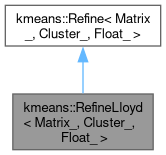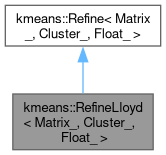Implements the Lloyd algorithm for k-means clustering. More...
#include <RefineLloyd.hpp>


Public Member Functions | |
| RefineLloyd (RefineLloydOptions options) | |
| RefineLloyd ()=default | |
| RefineLloydOptions & | get_options () |
 Public Member Functions inherited from kmeans::Refine< Index_, Data_, Cluster_, Float_, Matrix_ > Public Member Functions inherited from kmeans::Refine< Index_, Data_, Cluster_, Float_, Matrix_ > | |
| virtual Details< Index_ > | run (const Matrix_ &data, Cluster_ num_centers, Float_ *centers, Cluster_ *clusters) const =0 |
Detailed Description
class kmeans::RefineLloyd< Index_, Data_, Cluster_, Float_, Matrix_ >
Implements the Lloyd algorithm for k-means clustering.
The Lloyd algorithm is the simplest k-means clustering algorithm, involving several iterations of batch assignments and center calculations. Specifically, we assign each observation to its closest cluster, and once all points are assigned, we recompute the cluster centroids. This is repeated until there are no reassignments or the maximum number of iterations is reached.
In the Details::status returned by run(), the status code is either 0 (success) or 2 (maximum iterations reached without convergence). Previous versions of the library would report a status code of 1 upon encountering an empty cluster, but these are now just ignored.
- Template Parameters
-
Index_ Integer type of the observation indices. This should be the same as the index type of Matrix_.Data_ Numeric type of the input dataset. This should be the same as the data type of Matrix_.Cluster_ Integer type of the cluster assignments. Float_ Floating-point type of the centroids. This will also be used for the internal distance calculations. Matrix_ Class satisfying the Matrixinterface.
- See also
- Lloyd, S. P. (1982).
Least squares quantization in PCM. IEEE Transactions on Information Theory 28, 128-137.
Constructor & Destructor Documentation
◆ RefineLloyd() [1/2]
|
inline |
- Parameters
-
options Further options to the Lloyd algorithm.
◆ RefineLloyd() [2/2]
|
default |
Default constructor.
Member Function Documentation
◆ get_options()
|
inline |
- Returns
- Options for Lloyd clustering. This can be modified prior to calling
run().
The documentation for this class was generated from the following file:
- kmeans/RefineLloyd.hpp
Generated by